(Take a virtual tour of Broetje Orchards here.)
Twenty-first century seasonal farm workers have a lot in common with 18th century industrial workers.
The onset of the Industrial Revolution in the mid-18th century brought major changes in technology, manufacturing and agriculture. With it came major social and economic upheaval; while the new middle class earned more and had more choices as consumers, the working poor suffered long working hours at low pay at low wages, working conditions dominated by machines, child labor, and dirty, unhealthy living conditions.
It was in 1799 that reformer Robert Owen turned his father-in-law’s Welsh cotton mill into a model working community. He transformed an unhappy and unwilling workforce into enthusiastic and efficient workers by:
- Reducing their hours
- Tracking their performance
- Providing good quality housing, a school and a non-profit company store
Fast forward to 2010. Seasonal farm workers picking tomatoes in Florida are paid 45¢ for every 32 pound bucket they pick. In California, about 75% of all farm workers make less than $15,000 a year; 43% make less than $10,000 a year. Compound that with poor working and living conditions, child labor, and no health care, and you have modern day versions of 18th century industrial workers.
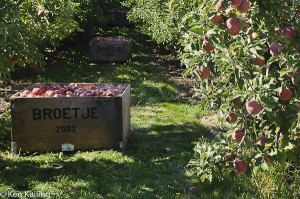 Ralph Broetje, founder/owner of Broetje Orchards, Prescott WA, is a modest man who clearly does not consider himself a latter-day reformer, but he is following Owen’s model.
Ralph Broetje, founder/owner of Broetje Orchards, Prescott WA, is a modest man who clearly does not consider himself a latter-day reformer, but he is following Owen’s model.
Founded in the late 1970s, the present day orchard generates sales of more than $80 million from approximately 5000 acres of conventionally grown apples and about 1000 acres of organic apples. More than 2500 workers harvest those apples and nearly 1000 work year round to keep the orchard – and its workers – healthy and productive.
The Perfect Apple
To deliver box after box of perfect apples requires careful handling beginning with the tree and ending with the final sort of the fruit as it is boxed and shipped.
At Broetje Orchards, trees bearing eleven varieties of apples are spread across the landscape: Braeburn, Red Delicious, Jonagold, Cameo, Fuji, Golden, Pink Lady, Granny Smith, Gala, Honey Crisp, Ginger Gold.
The summer of 2010 produced larger apples than usual. A warm spring, cool wet summer, and a sudden hot spell in late July and early August combined to encourage sudden growth and additional sweetness in the fruit.
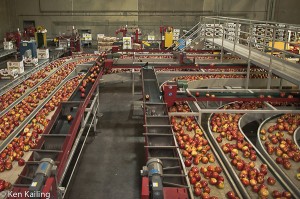 Once the huge crates of apples are delivered to the sorting and packing operation, a highly automated computer-aided process takes over.
Once the huge crates of apples are delivered to the sorting and packing operation, a highly automated computer-aided process takes over.
Varieties of apples are processed one at a time. Organics are packed on Mondays (and Tuesdays, if needed) because all equipment throughout the entire packing and shipping operation must be carefully cleaned to maintain an organic process from beginning to end. All boxes, padding, and handling materials are changed over too.
As the apples pass down the conveyors in the packing plant, they are rolled over and over in front of a series of cameras that check to see that the color is consistent and up to standard for the variety. For some varieties, the apples are passed under photo detectors that use special light beams to inspect the fruit for internal spoilage not obvious with external quality checks.
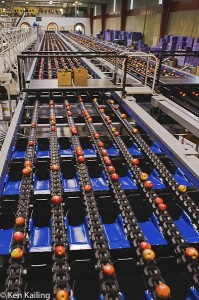 Finally each apple passes over a small, very sensitive scale where it is graded by size. A label is affixed and a small gate opens to divert the apple to the proper packing line. Those apples that don’t pass inspection are routed to manual sorting where they are separated into categories for peeling (to become McDonald’s Apple Fries), cooking for applesauce, or juicing.
Finally each apple passes over a small, very sensitive scale where it is graded by size. A label is affixed and a small gate opens to divert the apple to the proper packing line. Those apples that don’t pass inspection are routed to manual sorting where they are separated into categories for peeling (to become McDonald’s Apple Fries), cooking for applesauce, or juicing.
The fruit is packed according to customer specifications for stores like Costco, which have special clamshell packs in display cartons, or for general distribution to markets that display loose fruit. More than 30,000 40-pound boxes of fruit are packed every day at the peak of the season.
Giving Back
At a time when companies are labeling themselves “green,” “socially responsible,” and “fair trade,” Broetje Orchards is quietly building on a philosophy established 40-plus years ago: the Quadruple Bottom Line. It’s a concept that goes beyond “people, profits, the planet” to include organizational “purpose.”
Profit
Without profits, no business can continue for any appreciable amount of time, however at Broetje Orchards, profits are used to build an economically strong community as well as a strong business.
Paying fair wages and providing year-round employment for hundreds of staff builds job security in the Yakima Valley. Profits from the company are shared: 5% of pre-tax profits are distributed equally to all year-round employees as part of annual profit sharing and another 5% are given as wage increases to all employees.
Planet
Broetje Orchards follows organic and low-chemical-input growing methods for production. Broetje’s conventional acreage is about 99% organic, incorporating integrated pest management, commercial fertilizer and just one post-harvest spray. Greatly reduced chemical inputs mean safer growing and harvesting conditions for the environment and the workers.
Because the orchard is located in the dry Yakima Valley, irrigation is key to growing healthy fruit, and careful monitoring and efficient use of water is a key strategy.
People
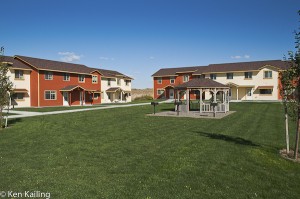 Broetje Orchards is 50 miles from Kennewick, a town of 65,000 people, and 150 miles from Spokane. Such distances make employee and community-centered programs important. Staff benefits include reasonable work shifts, limited night shifts, on-site subsidized childcare, and on-site health care assistance. On-site subsidized housing includes homes and apartments for several hundred permanent and seasonal employees and their families.
Broetje Orchards is 50 miles from Kennewick, a town of 65,000 people, and 150 miles from Spokane. Such distances make employee and community-centered programs important. Staff benefits include reasonable work shifts, limited night shifts, on-site subsidized childcare, and on-site health care assistance. On-site subsidized housing includes homes and apartments for several hundred permanent and seasonal employees and their families.
Inside the immaculately clean packing operation is a large, brightly lit break/lunchroom that serves as a community center for baby showers, dances, and other gatherings.
Taking Robert Owen’s 18th century reforms one step further, Broetje has expanded educational opportunities for employees and their families to include scholarship programs, English as a Second Language (ESL) and GED classes, an on-site elementary school (K-6), and summer programs for elementary students.
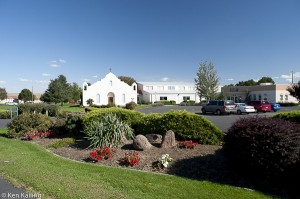 While many companies would be satisfied with a small corporate giving program, Broetje Orchards established Vista Hermosa Foundation. Every year, at least 50% of pre-tax profits go to the Foundation, which has donated more than $50 million since it was launched in 1990.
While many companies would be satisfied with a small corporate giving program, Broetje Orchards established Vista Hermosa Foundation. Every year, at least 50% of pre-tax profits go to the Foundation, which has donated more than $50 million since it was launched in 1990.
Those funds go to local, national and international projects reaching as far as India and Kenya. Contributions also go the projects in Mexico, Haiti, and the Dominican Republic.
Purpose
It’s the organizational culture at Broetje Orchards that contributes to the company’s unique approach to management. Professional development includes implementation of leadership teams, management evaluation by staff, and promotion from within.
Personal development opportunities come through program called Servant Leadership, which focuses on the employee as a whole person with leadership potential in their families and their communities as well as in the workplace.
Employees are also encouraged to participate in philanthropic and volunteer opportunities through the Vista Hermosa Foundation.
For more information about Broetje Orchards, visit the company’s website here.

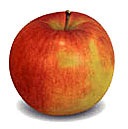
A most impressive responsible commercial enterprise.
My hat’s off to you. you should be proud to achieve this in your lifetime.